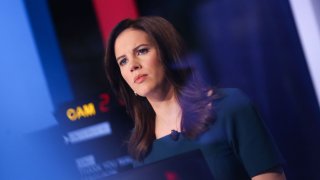
"Don't foam the runway just yet," warned J.P. Morgan's chief U.S. economist, Michael Feroli, yesterday. "A 'soft-ish' landing in 2023 looks iffy."
This is exactly what the growing "behind the curve" crowd (Larry Summers, John Taylor, Bill Dudley, Michael Darda, Greg Ip last week) has been arguing. The risk is not that the Fed is risking a recession right now with its sudden scramble towards rate hikes. The risk is that the Fed is still way too far behind the curve, letting policy run too loose, and its catch-up next year could trigger a downturn.
Goldman Sachs, in fact, put new numbers to this in its own research yesterday. "At the moment, the real policy rate--which we define as the nominal rate minus expected inflation over the coming year--is roughly -5%, the lowest in the modern era," the firm wrote. Let that sink in for a moment. We are more than two full years from the pandemic crisis that triggered the Fed's historic policy reaction--and real rates are lower now, as the recovery is almost complete, than they were at any prior point during the actual emergency.
There are only two ways the Fed can fix this; either by jacking up its target rate, currently around 0.4%, to say, 5% (which coincidentally is where the "Taylor Rule" would put it right now); or somehow finding a way to bring inflation expectations way down, which seems unlikely to happen unless they just say, "We are going to jack up rates to 5%" and maybe the market will believe them and price that in without the Fed having to actually go that far.
Neither course seems likely right now, which is why economists are starting to panic a bit. "The inflation outlook is very concerning, and the Fed still forecasts that GDP will grow [a full point] above potential this year," Goldman wrote yesterday. If the Fed decides it has to slow the economy further to avoid a "dangerous...further tightening of resource utilization," they would have to do more than the two half-point rate hikes in coming months and two points of tightening by year-end that's already priced into the market.
Chair Powell himself in his press conference two weeks ago said the labor market is already "tight to an unhealthy level," as J.P. Morgan's Feroli points out. The problem is, "slowing growth in a way that just nudges up the unemployment rate hasn't happened [in history]." The Fed let the unemployment rate get unsustainably low, in other words. It's never before risen by "just a little bit" without coinciding with a recession. Feroli (and others, like Dudley) have specifically warned that this was a likely outcome of their new policy framework. And already, here we are.
The yield curve, Feroli says, isn't signaling economic trouble between now and next summer; it projects the Fed's funds rate higher in the middle of next year than it is now, which "wouldn't be the case" if recession was anticipated in the meantime. But the market is starting to signal trouble beyond that point, as that "forward spread" for a year from now just turned negative (or "inverted"), Feroli notes.
Money Report
So let's put it this way. If nothing changes, these analysts are implying that the Fed has already sealed a course towards recession a year or so from now. To me, that suggests why not try to avoid it by dramatically tightening right now? At least float it, and see what happens--does Feroli's forward spread un-invert? What happens across the rest of the yield curve? Would consumer and housing stocks, many of which are already priced for recession, do better or worse?
I thought Gary Friedman, the CEO of RH (Restoration Hardware), perfectly captured the angst of our current economic moment. On his earnings call Tuesday evening, in comments that have since gone viral, he talked at length about the various challenges RH has been facing, from supply chain to inflation to even the Ukraine crisis, which caused a sudden pullback in high-end customer demand.
"It just became a kind of reckoning point, if you will, where people had to stop and pay attention to everything," he said. "When it returns to normal, I'm not sure. How aggressive is the Fed going to be? Not sure. I don't mean to be a pessimist, but history would tell us, four to five times the Fed raises rates over a sustained period, we have a recession..."
Earlier on he noted, "You've got inflation like I've never seen...either businesses are going to make a lot less money or they're going to raise their prices. And I don't think anybody really understands how high prices are going to go." On housing, he said, "You've got housing prices at all-time highs. Is it sustainable? I don't know for how long. Doesn't make sense."
Friedman even invoked the famous scene from The Big Short when Bear Stearns' stock price collapses while a bullish major investor is on stage talking it up. "And look, maybe our stock is going to take a big hit because of this," Friedman said, alluding to his remarks and the company's own conservative guidance. "But in my twenty-two years, I've never been more excited and I've also never been more uncertain."
Now, some might say this is exactly why the Fed shouldn't do anything to further destabilize the economy and the markets right now (shares of RH, for instance, have slumped nearly 40% this year and are trading at less than 13 times forward earnings). But I'd say, at this point, they have little to lose.
See you at 1 p.m!
Kelly






